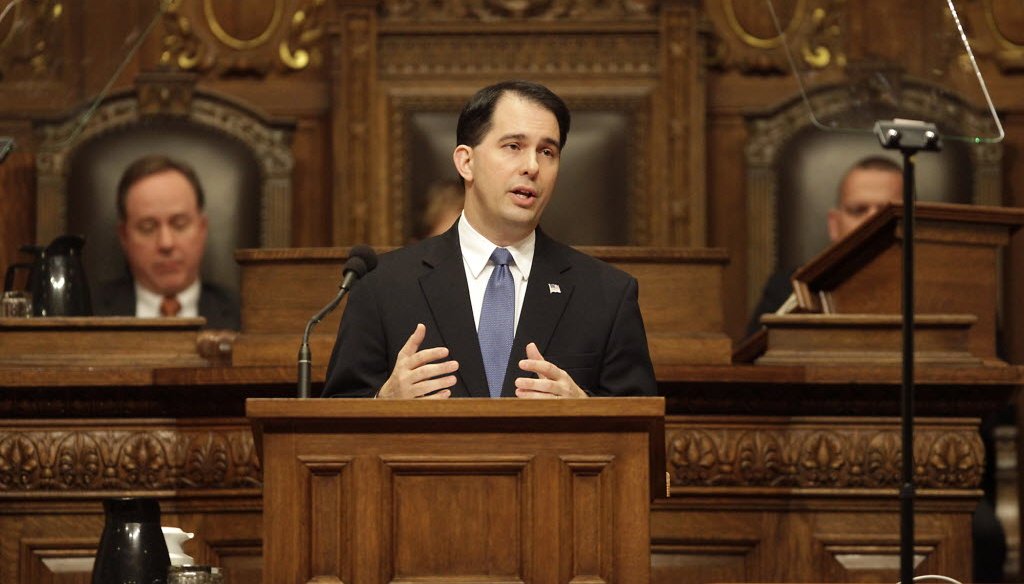Stand up for the facts!
Our only agenda is to publish the truth so you can be an informed participant in democracy.
We need your help.
I would like to contribute

Gov. Scott Walker introduced his 2013-15 budget in a February 2013 speech. Modified by the Legislature, the budget is controversial on a number of fronts.
Gov. Scott Walker has said he will sign the 2013-15 state budget into law on June 30, 2013.
The two-year tax-and-spending plan takes effect the next day.
Private has been a contentious word in the budget: an expansion of private school vouchers, a new private-school tax deduction, the creation of a private bail bond system.
There have been battles, too, over an Obamacare expansion of Medicaid, how much state-owned land to set aside for conservation and residency requirements for city employees.
We’ve covered the budget terrain with a number of Truth-O-Meter items. Here’s a roundup of budget-related claims.
Sign up for PolitiFact texts
Private school vouchers
Under the budget, the school voucher program -- public money pays for kids to attend private schools -- can be expanded outside of Milwaukee and Racine by 500 students in 2013-14 and by 1,000 students in each year thereafter. Assembly Minority Leader Peter Barca, D-Kenosha, said the Department of Public Instruction estimated the expansion could cost nearly $2 billion per year. But the expansion will cost an average of $192.5 million in the two-year budget. The $2 billion estimate assumed a major expansion, not yet approved, years down the road. We rated that claim Pants on Fire.
(We also did an article examining claims and counterclaims about public versus private schools, including which show higher student performance.)
Private school tax break
The budget offers a state income tax deduction of up to $10,000 for sending a student to private school. State schools superintendent Tony Evers said that's the most generous such tax break in the nation. We rated that claim Half True. The $10,000 maximum deduction, for high school students, is the largest among the handful of states that offer private school tax breaks. But it's not the most generous in all circumstances, depending on a family’s income, the number and ages of their children and a state’s income tax rates.
Bail bonds
The budget would usher in commercial bail bonds into the court system for the first time since 1979. Defendants pay a bail agent 10 percent of the full cash bail amount. The company must pay 3 percent of the bail amount to the court. If the defendant fails to appear in court, the bonding company is liable for the full amount. But a bail agent usually has an opportunity to recover a no-show defendant using bounty hunters.
Sen. Lena Taylor, D-Milwaukee, said "there is no statistical evidence" that bail bonds improve the likelihood of a defendant returning to court for hearings. We rated that claim False. There’s no definitive evidence, but various statistical studies have shown that bail bonds are associated with, and may be a cause of, lower no-show rates.
Assembly Speaker Robin Vos, R-Rochester, said a study shows Wisconsin defendants fail to show up in court more often than defendants in states that have private bail bonds. We rated that claim False. The study doesn’t compare states and doesn’t include a Wisconsin figure. And while various studies of local municipalities show lower no-show rates for private bail and therefore suggest the same advantage would hold for Wisconsin, Vos spoke as if the question is settled.
Obamacare and Medicaid
Walker refused an offer under Obamacare to expand eligibility for Medicaid. Federal funds would have paid the lion's share of the cost. Instead, the state budget will do a more limited expansion of Medicaid and move more people into private insurance through Obamacare's "exchanges."
Walker's secretary of health services, Kitty Rhoades, claimed Wisconsin was not "walking away from a dime" in federal funds by refusing the Obamacare expansion. We rated the claim Mostly False. Walker's alternative will bring in some federal funds, but it will cost state taxpayers $119 million more just during the 2013-15 budget than if the Obamacare expansion were done, a figure Rhoades didn't dispute.
General income tax cut
The budget reduces personal income taxes by $651 million during 2013-15. Seeking a larger reduction, state Rep. Dale Kooyenga, R-Brookfield, argued that Wisconsin has one of the most progressive tax codes in the country -- progressive, as in, tax rates rise with earnings. We rated the claim Mostly True. Studies put Wisconsin’s income tax as more progressive than two-thirds to four-fifths of the states that levy such a tax.
Conservation land
Defending a proposal to spend less state money acquiring land for conservation, Sen. Alberta Darling, R-River Hills, said "18 percent of our land in our state right now is either federally, state or county owned for conservation purposes." We rated the claim True. The more up-to-date figure is 17 percent, but it is an estimate.
Residency requirements
The budget repeals all residency rules for teachers and other workers for all local units of governments with the exception of police, fire or emergency personnel, who would have to live within 15 miles of the boundaries of their jurisdictions. In fighting the change, Milwaukee Mayor Tom Barrett said a state report projected that half of City of Milwaukee employees would move out of the city within 10 years. We rated the claim Mostly False. The report said experience elsewhere "may provide some insight" into Milwaukee’s fate, but it stopped well short of predicting Milwaukee’s experience.
UW System tuition
Largely because of lawmakers' anger over revelations of the size of cash reserves in the University of Wisconsin System, the budget puts a two-year freeze on tuition at UW campuses. At one point, UW System President Kevin Reilly said the reserve is in the "mid- to low-range" of what comparable public university systems have. We rated the claim Half True. Using a key measure, Wisconsin’s level of reserves is below that of some of its peers. But there is debate about whether some of the state systems the UW System considers to be peers are in fact peers. And figures simply aren’t available for other peer systems.
Our Sources
PolitiFact Wisconsin items as noted


























